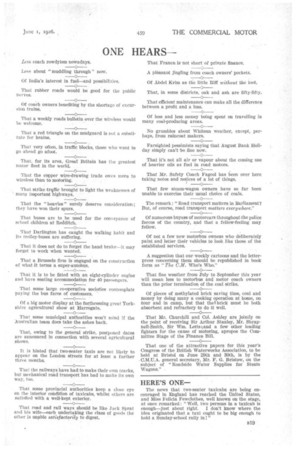ONE HEARS
Page 33

If you've noticed an error in this article please click here to report it so we can fix it.
Less coach rowdyism nowadays.
Less about "muddling through" now.
Of India's interest in fuel—and possibilities.
That rubber roads would be good for the public nerves.
Of coach owners benefiting by the shortage of excursion trains.
That a weekly roads bulletin over the wireless would be welcome.
That a red triangle on the mudguard is not a substitute for brains.
That very often, in traffic blocks, those who want to go ahead go afoot.
That, for its area, Great Britain has the greatest motor fleet in the world.
That the copper wire-drawing trade owes more to wireless than to motoring.
That strike tr.iffic brought to light the weaknesses of ' many important highways.
That the "heavies" surely deserve consideration; they have won their spurs.
That buses are to_he used for the conveyance of school children at Redditch.
That Darlington has caught the walking habit and its trolley-buses are suffering.
That it does not do to forget the hand brake—it may forget to work when wanted.
That a Brussels firm is engaged on the construction of what it terms a super-antobus.
That it is to be fitted with an eight-cylinder engine and have seating accommodation for 40 passengers.
That some large co-operative societies contemplate paying the bus fares of customers.
Of a big motor display at the forthcoming great Yorkshire agricultural show at Harrogate.
That some municipal authorities won't mind if the Australian team does take the ashes back.
That, owing to the general strike, postponed dates are announced in connection with several agricultural shows.
It is hinted that two-seater taxis are not likely to appear on the London streets for at least a further three months.
That the railways have had to make their own tracks, but mechanical road transport has had to make its own way, too.
That some provincial authorities keep a close eye on the interior condition of taxicabs, whilst others are satisfied with a well-kept exterior.
That road and rail ways should be like Jack Sprat and his wife—each undertaking the class of goods the other is unpble satisfactorily to digest. That France. is not short• of private finance.
A pleasant jingling from coach owners' pockets.
Of Abdel Krim as the little Riff without the loot.
That, in some districts, oak and ash are fifty-fifty.
That efficient maintenance can make all the difference between a profit and a loss.
Of less and less money being spent on travelling in many coal-producing areas.
No grumbles about Whitsun weather, except, perhaps, from raincoat makers.
Farsighted pessimists saying that August Bank Holiday sieaply can't -be fine now.
That it's not all air or vapour about the coming use of heavier oils as fuel in road motors.
That Mr. Safety Coach Fageol has been over here taking notes and notices of a lot of things.
That few steam-wagon owners have so far been unable to exercise their usual choice of coals.
The remark : "Road transport matters in Parliament? But, of course, road transport matters everywhere."
Of numerous buyers of motorcars throughout the police forces of the country, and that a fellow-feeling may follow.
Of not a few new motorbus owners who deliberately paint and letter their vehicles to look like those of the established services.
A suggestion that our weekly cartoons and the letterpress concerning them should be republished in book form as "The U.M. Who's Who."
That fine weather from July to September this year will mean less to motorbus and motor coach owners than the prior termination of the coal strike.
Of pieces of methylated brick saving time, coal and money by doing many a cooking operation at home, on tour and in camp, but that the brick must be both absorbent and refractory to do it well.
That Mr. Churchill and Col. Ashley are jointly on the point of receiving Sir Arthur Stanley, Mr. Shrapnell-Smith, Sir Wm. Letts‘and a few other leading fighters for the cause of motoring, apropos the Committee Stage of the Finance Bill.
That one of the attractive papers for this year's Congress of the British Waterworks Association, to be held at Bristol on June 20th and 30th, is by the .C.M.U.A. general secretary, Mr. F. G. Bristow, on the subject of "Roadside Water Supplies for Steam Wagons."


























































